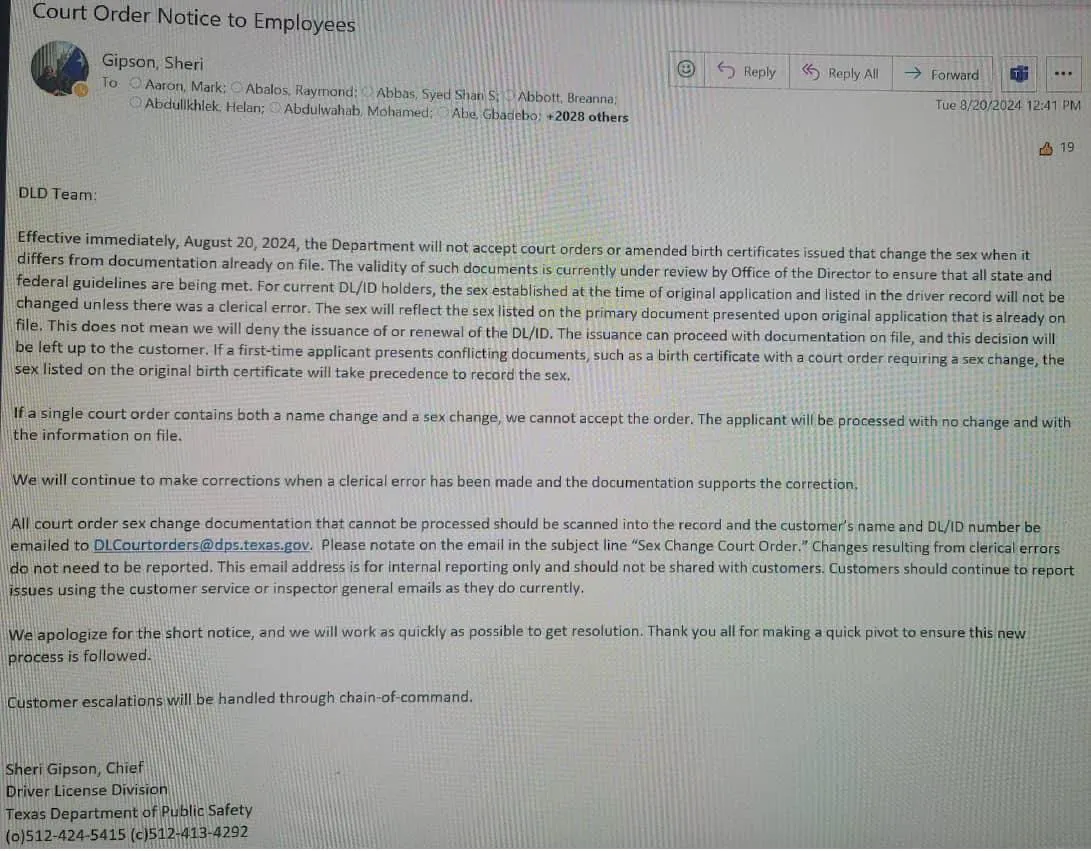On Tuesday, the Texas Department of Public Safety announced in an internal email that it will no longer accept amended birth certificates or court orders to change gender markers on a person’s driver’s license. The email also states that name changes accompanying gender marker changes will not be accepted. Meanwhile, reports from Montana indicate similar bans on driver’s license changes are occurring there, and the state has similarly ignored court orders allowing for gender marker changes. In Missouri, a new and unannounced internal policy now requires transgender individuals to undergo gender reassignment surgery or obtain a court order to change their gender marker. These states join Florida, Tennessee, and Kansas, which have banned gender marker changes entirely, imposing significant challenges on transgender people in their daily lives.
The Texas policy was announced in an email entitled “Court Order Notice to Employees” by Sheri Gipson, Chief of the Drivers License Division at the Texas Department of Public Safety. The email states that “effective immediately, the department will not accept court orders or amended birth certificates that change the sex when it differs from the documentation already on file.” It also states that if somebody presents a court order that contains both a name and a sex change, a common type of court order for a transgender person to seek out, the division will not accept the order and issue no correction.
Perhaps most troublingly, a database will be made to track those who attempt to make these changes. Anyone who attempts to change their drivers license gender marker will have the information sent to DLCourtorders@dps.texas.gov, noting that the email address is for “internal reporting only” and “should not be shared with customers.”
See the email here:

Attorney General Ken Paxton’s office released a statement about the change, indicating his intention to continue to ignore court orders:
“The Office of the Attorney General (OAG) has recently raised concerns regarding the validity of court orders being issued which purport to order state agencies-including DPS-to change the sex of individuals in government records, including driver licenses and birth certificates. Neither DPS nor other government agencies are parties to the proceedings that result in the issuance of these court orders, and the lack of legislative authority and evidentiary standards for the Courts to issue these orders has resulted in the need for a comprehensive legal review by DPS and the OAG. Therefore, as of Aug. 20, 2024, DPS has stopped accepting these court orders as a basis to change sex identification in department records – including driver licenses.”
Texas is not the only state targeting the ability of transgender individuals to change their driver’s licenses. In Missouri, a quietly implemented internal policy has removed the option to use a physician’s, therapist’s, or social worker’s signature to change one’s gender marker. Now, gender reassignment surgery or a court order is required. The latter is increasingly difficult to obtain, as many states are defining sex in a way that excludes transgender people, effectively banning such court orders.
I am also receiving reports from Montana that driver’s license gender marker changes are being denied, even to those with court-ordered name and gender marker changes. Recently, the Montana Department of Justice implemented changes that would only allow transgender Montanans to use amended birth certificates to change their gender markers. However, credible sources tell me that even amended birth certificates are being rejected. Montana has been embroiled in an ongoing dispute with state courts, at times outright ignoring court orders regarding gender marker changes.
Transgender people’s driver’s licenses have been targeted in several states in recent months, including Tennessee, Florida, Arkansas, and Kansas. In Kansas, Attorney General Kris Kobach has stated his intention to reverse driver’s license changes for transgender individuals. In Florida, transgender people attempting to amend their driver’s license gender markers are being threatened with criminal fraud charges. Meanwhile, in Arkansas, a rule that would have restricted driver’s license changes has been blocked in court.
Under these policies, transgender people could face considerable challenges in their day-to-day lives, and policies like these could force transgender adults to leave their states. Any time a transgender person shows their drivers license with an incorrect gender marker, they could be targeted with abuse or harassment — incorrect gender markers on official documents have been shown to increase the likelihood of harassment and abuse. Meanwhile, those with corrected gender markers are shown to have lower suicide risks. Incorrect gender markers may force trans people to disclose their identity in various situations, such as during interactions with highway patrol officers or when being carded at a restaurant. Such disclosures can be dangerous, particularly in encounters with individuals harboring anti-trans sentiments.
In a statement, Brad Pritchett of Equality Texas said, “Just like people who change their names after marriage want their correct name on their license, trans Texans want their driver’s license to reflect their gender. We use our IDs to navigate all areas of life, driving, voting, employment. Having an ID that reflects who you are is a basic form of dignity that many take for granted.”
Meanwhile, Ian Pittman, a family law practitioner, pointed to a 2022 attempt to create a database of transgender people by Ken Paxton which appears to have failed at the time. Speaking of the new rule, he said, “That’s the biggest concern I have… What are they going to do with that information?”
Entire states are becoming increasingly hostile not just to transgender youth, but to transgender adults as well. Activists within the Republican Party have made it clear that this is no accident; according to some of their most vocal members, the initial focus on targeting transgender youth was only the beginning. The ultimate goal, they’ve stated, is to ban gender changes for everyone. Texas is a stark example, where the state’s platform has long advocated for the complete denial of legal recognition for transgender people — a policy they now seem intent on implementing, step by step.
This piece was republished with permission from Erin In The Morning.
Press freedom is under attack
As Trump cracks down on political speech, independent media is increasingly necessary.
Truthout produces reporting you won’t see in the mainstream: journalism from the frontlines of global conflict, interviews with grassroots movement leaders, high-quality legal analysis and more.
Our work is possible thanks to reader support. Help Truthout catalyze change and social justice — make a tax-deductible monthly or one-time donation today.
